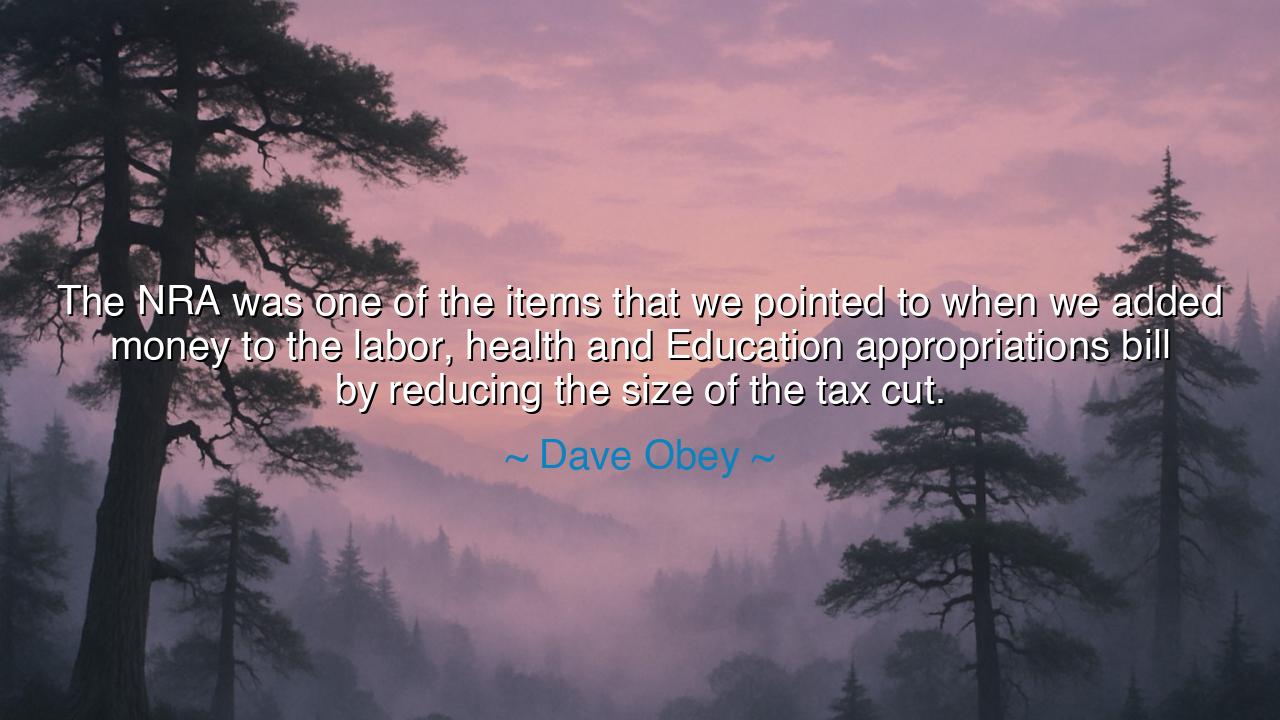
The NRA was one of the items that we pointed to when we added
The NRA was one of the items that we pointed to when we added money to the labor, health and Education appropriations bill by reducing the size of the tax cut.






“The NRA was one of the items that we pointed to when we added money to the labor, health and education appropriations bill by reducing the size of the tax cut.” Thus spoke Dave Obey, a statesman whose words carry the weight of a man striving to balance the scales of justice and policy. Though born of modern politics, his statement echoes an ancient tension — the eternal struggle between wealth and welfare, between the privileges of the few and the needs of the many. Beneath his words lies a message as old as civilization itself: that the prosperity of a nation cannot be measured by the fullness of its treasuries, but by the well-being of its people.
In these words, Obey recalls the difficult art of governance — the act of choosing what must be sacrificed for the greater good. The tax cut, a symbol of private gain, was reduced so that the lifeblood of public service — labor, health, and education — might be strengthened. This is no small matter, for such choices define the character of a nation. The ancients taught that justice is not the equal division of all things, but the rightful ordering of them: that which gives each element its proper due. In this light, Obey’s words remind us that a society must sometimes restrain its greed if it wishes to preserve its heart.
The mention of the NRA, the National Rifle Association, is no accident. It stands as a symbol — not merely of a political group, but of the forces of influence and power that often dominate the affairs of men. Throughout history, rulers and leaders have wrestled with such forces: the guilds of merchants in Florence, the landed nobles of England, the oligarchs of Athens — each defending their interests while the poor sought justice in their shadow. Obey’s act was an assertion that public good must not be silenced by the clamor of privilege. It is the ancient struggle of the statesman against the tyrant, of conscience against convenience.
Consider the example of Solon of Athens, the great lawgiver who, in the sixth century before Christ, faced a nation divided between the rich and the destitute. When the wealthy demanded privilege and the poor cried for deliverance, Solon cut a path between them, forgiving debts and restoring balance to the city. He angered both sides, yet in his courage and wisdom, Athens found peace — and from that peace, democracy was born. So too did Dave Obey, in his modern way, walk the narrow road between competing powers, choosing to reduce what could have enriched the few in order to sustain what could uplift the many.
The deeper wisdom in his statement lies not merely in the political act, but in the moral principle it represents: that true leadership requires sacrifice. It is far easier to give gifts of gold than to defend the needs of those without voice. But the noble leader does not serve applause; he serves posterity. The ancients understood this well. Marcus Aurelius, emperor and philosopher, once wrote, “What brings no benefit to the hive brings none to the bee.” Obey’s words reflect that same philosophy — that the wealth of a people must flow like a river through all lands, not stagnate in one reservoir of privilege.
And yet, the choice he describes is not only the burden of rulers. It is the burden of every citizen. In every heart, there is a tax cut and an appropriation — a selfish desire to keep, and a generous impulse to give. The health of nations begins in the conscience of individuals. When a man gives up a little of his comfort so that others may learn, heal, or work, he too performs the sacred act that Obey described. Thus, every soul has its own budget of compassion, its own moral ledger to balance.
Therefore, let the lesson be clear: justice demands trade-offs, and wisdom demands courage. We must ask ourselves, in our homes and in our nations, how we use our wealth — whether to indulge fleeting desires or to build lasting foundations. Education, health, and labor are not mere expenses; they are the pillars of civilization. A society that invests in them plants seeds that will bloom for generations. And if a little gold must be taken from the coffers of the few to feed the future of the many, then let it be done with pride, for that is the true mark of a civilized people.
So, remember these words of Dave Obey not as a relic of political debate, but as a timeless teaching: that leadership, and indeed citizenship itself, is the art of balancing power with mercy, and wealth with wisdom. For when a people choose compassion over indulgence, they do not lose — they save themselves. In serving others, they secure their own salvation; in sacrificing luxury, they purchase virtue. And when such choices are made, the state — like the soul — finds its true health restored.






AAdministratorAdministrator
Welcome, honored guests. Please leave a comment, we will respond soon